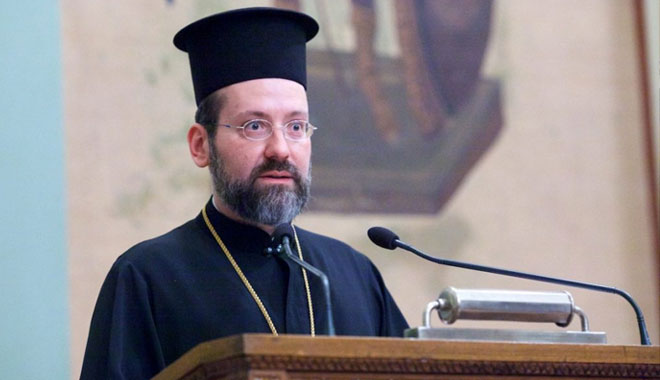By Archbishop Job of Telmessos
“Christ’s love moves the world to reconciliation and unity” is the theme chosen by the World Council of Churches for its 11th Assembly which ought to be held in Karlsruhe, Germany this year, but which will take place, God willing, from 31 August to 8 September 2022 due to the pandemic of COVID-19.
The chosen theme of Christ’s love is central in the New Testament, especially in the Johannine writings which insist that love (agape) is above all a name or a characteristic of God: “Ὁ Θεός ἀγάπη ἐστί” – “God is love” (1 Jn. 4:8). It is also stressed that without love, one can neither know God nor remain in him: “whoever does not love does not known God” (1 Jn. 4:8); “God is love. Whoever lives in love lives in God, and God in them” (1 Jn. 4:16).
In the fourth Gospel, Christ exhorts those who follow him to love one another as he loved them (Jn. 13:34-35). The love of the Christian must therefore reflect the love of Christ which in turn reflects the love of God. Therefore, reflecting Christ’s love is participating in the mystery of God. Christ affirms in the Fourth Gospel: “As the Father has loved me, so have I loved you. Now remain in my love” (Jn. 15:9). Christ’s love is always sacrificial. Christ speaks of this love when he says: “Greater love has no one than this: to lay down one’s life for one’s friends” (Jn. 15:13). The supreme example of unconditional love and free giving to others is given to us by Jesus Christ through his sacrifice on the Cross. Love, as the mystery of God, is revealed in the mystery of the salvation of mankind.
Love, as a characteristic of God, must also be the hallmark of the Christians. Christ underlines in fact: “By this everyone will know that you are my disciples, if you love one another” (Jn. 13:35). Sadly, the history of Christianity has often provided a counter-testimony to the love of Christ. Indeed, the divisions, schisms and heresies, which appeared since the apostolic period – let us remember for example the case of the Church of Corinth, where some claimed to be of Paul while others claimed to be of Apollos (cf. 1 Cor. 3:4-9) – and which continue until this day, prove to be a failure of Christians in the practice of the love of Christ. And this failure, as a counter-witness to Christ’s love, brings another failure in the mission of the Church, in the evangelization of the world. This failure, unfortunately, contributes to the secularization of the world. In the face of so many divisions resulting from pride, jealousy and hatred, the world is not being convinced to follow the evangelical path.
Christ’s love is therefore not only the foundation of Christian mission in order that the world may believe, but also the key for the reconciliation of the divided Christians. Only Christ’s love and the practice of his fundamental commandment to love one another as He loved us can reconcile the divided Christians and bring them to unity. In this way, through this witness of genuine disciples of Christ, Christ’s love can convert the world to believe in Jesus Christ.
Amid the present conditions of the ongoing global pandemic, the theme of Christ’s love seems a very appropriate and current subject. Hopefully, the WCC assembly will be an opportunity to reflect on the significance of Christ’s love in a world marked not only by the climate emergency, systemic economic injustice and national populisms, but also suffering from the drastic consequences of the pandemic of COVID-19. Christ’s love should inspire the response and the commitment of our Churches and of our believers living in a world longing for health, solidarity, peace, justice and unity.

